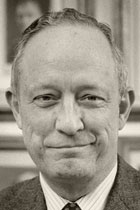M. Kenton King, M.D., dean of the Washington University School of Medicine for nearly 25 years, died Thursday, Oct. 15, 2009, at his home in University City. He was 84.

King was appointed the medical school’s first full-time dean in 1965 at age 40 after swiftly gaining the senior faculty’s confidence as acting dean for five months. He retired in 1989 as one of the longest-serving medical deans in the United States, as well as one of the most successful.
Under King’s guidance, the School of Medicine became one of the foremost institutions of medical education in the world. Through his leadership and vision, in particular his instrumental role in recruiting new heads of all medical school departments, he shaped the course of the institution.
At the same time, he championed a dramatic change in the composition of the student body, favoring more minority and women students. He told the St. Louis Post-Dispatch in 1964, “There is simply no basis for skepticism about women doctors any more … (W)omen have distinguished themselves beyond doubt in every field and function of medicine.”
During his tenure, the school’s campus grew tremendously, with several new buildings, including the McDonnell Medical Sciences Building, the Clinical Sciences Research Building, the Bernard Becker Medical Library and a renovation of the East Building. King also worked to strengthen the amount and quality of research and to bolster alumni relations.
Despite all of these accomplishments, King remained modest. Earlier this year, he said, “Many of the deans in the country were chosen for some other feature, such as their research. I had an attitude that some of the other deans did not possess: that is, I just wanted to do a good job as dean.”
King’s colleagues expressed sincere admiration and respect for his many leadership qualities: steadiness, patience, modesty and keen judgment.
“Ken King is one of my heroes,” says Larry J. Shapiro, M.D., executive vice chancellor for medical affairs and dean of the medical school. “In his quiet and unassuming way, he played a key role in shaping the current Washington University School of Medicine. He led with integrity and had the respect and confidence of faculty, students and staff. He served the school long and well and has left an enduring mark.”
“For his time in the history of the medical school, he was an ideal dean,” says William A. Peck, M.D., King’s successor as dean and now director of the Center for Health Policy. “It was a period of great growth and great expansion. When he stepped down in 1989, the school was far better off than when he started.”
“Ken was a great judge of people with a very effective management style,” Peck says. “He learned a great deal about people because he was arguably one of the finest listeners. People respected his judgment, and he created an aura of respect.”
William Danforth, M.D., chancellor emeritus, was vice chancellor for medical affairs at the School of Medicine while King was dean. Danforth and King met in 1951 while interns at Barnes Hospital.
“Ken King was one of the greatest people that I’ve ever worked with,” Danforth says. “He was a marvelous dean, very intelligent, totally unselfish, never built himself up and always put the needs of the school first. Everyone trusted him, and he treated everybody very well. He was a wonderful human being.”
King, an Oklahoma City native, was recruited the School of Medicine faculty in 1957 as an instructor of medicine and director of the Student Health Service. He was associate dean from 1962-65. He was named the first Danforth Professor of Medicine and Public Health in 1967.
After serving in the Pacific with the U.S. Navy during World War II, King earned a bachelor’s degree from the University of Oklahoma in 1947. With support provided by the G.I. Bill, he earned a medical degree from Vanderbilt University School of Medicine, where he finished seventh in his class in 1951. He completed an internship and residency at Barnes Hospital in St. Louis and at Vanderbilt University Hospital in Nashville. He completed a two-year research fellowship in microbiology at Johns Hopkins University School of Medicine in Baltimore in 1957.
In 1966, King was honored by the U.S. Navy with a Certificate of Merit for his work in the Naval Reserve medical program.
King is survived by his wife, June Greenfield King, a 1951 graduate of the Washington University School of Nursing and formerly head nurse on a Barnes Hospital medical and surgical ward; four sons: Doug and John, of St. Louis; David, of Hammonton, N.J., and Tom, of Forest Hills, N.Y.; and eight grandchildren. Their son Michael, a University City Police Sergeant and a Washington University alumnus, was killed while on duty in October 2008.
Services will be held at 10 a.m. Oct. 21 at First Presbyterian Church in University City. A memorial service at the School of Medicine is planned for a later date. Memorial contributions may be made to Backstoppers Inc., 10411 Clayton Road, Suite A5, St. Louis, Mo., 63131, or to a charity of one’s choice.